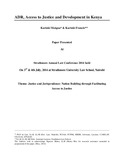| dc.description.abstract | Development is not feasible in a conflict situation. Conflicts and disputes must be
managed effectively and expeditiously for development to take place. Formal mechanisms for
conflict management have not
always
been effective in managing conflicts.
Mechan
isms
such as
courts have been inaccessible by the poor
owing to
technicalities, complex procedures, high
costs and delays. There has been a shift towards informal mechanisms for conflict management,
including alternative dispute resolution (ADR) and tradit
ional dispute resolution mechanisms
(TDRM).
ADR and TDRM processes contribute to enhanced access to justice by all, and in
particular among the poor people. Enhanced access to justice strengthens the
Rule of Law
.
Existing literature in development studies
has shown a correlation between the
Rule of Law
and
levels of development. ADR and TDRMs are thus quintessential from a developmental
perspective. The Kenyan legal framework has recognized the role of ADR and TDRM in
development. Existing laws require the
use of ADR and TDRM in resolving a myriad of disputes
such as those relating to land, family matters, commercial and political questions.
In this paper the authors argue that the recognition of ADR and TDRMs within the legal
framework in Kenya, will con
tribute towards economic, social, cultural and political
development. This recognition expands the array of mechanisms that parties to a dispute can
employ in ventilating their disputes. Enhanced access to justice will also contribute to respect for
the
ru
le of law
, which is an essential precondition to development. ADR is also becoming a
lucrative economic venture with many professionals now working as full
-
time or part
-
time ADR
practitioners. In addition, a number of organisations have established ADR cen
tres. Some of
these centres are expected to be major attractions for foreign investments in the country as they
will handle international arbitrations. ADR is also being taught in schools and in universities,
and is thus expected to contribute to social de
velopment. | en_US |

